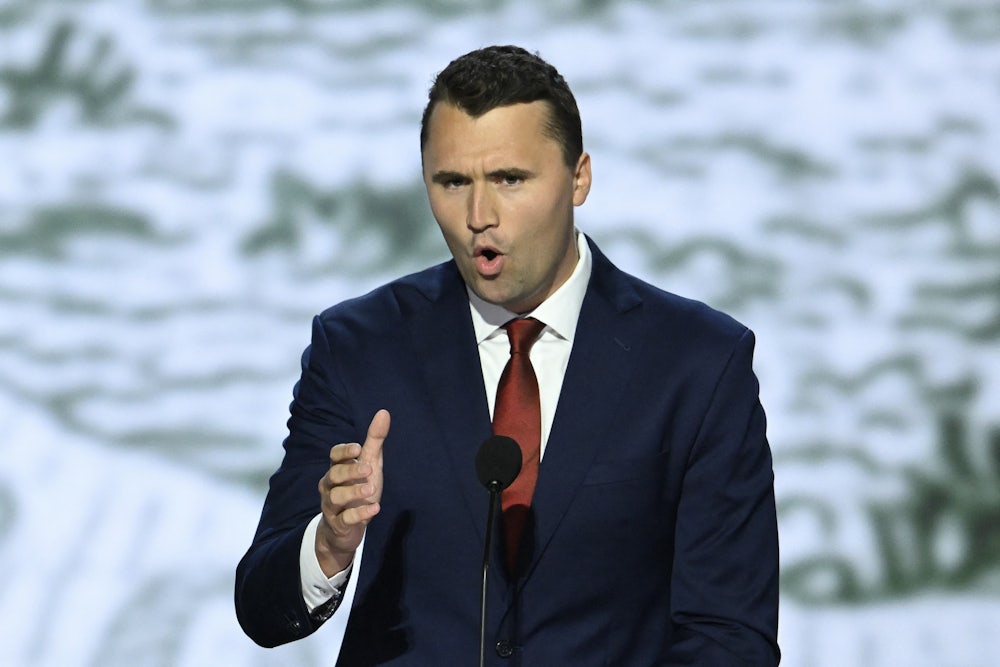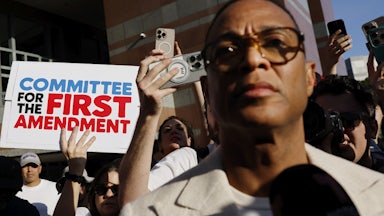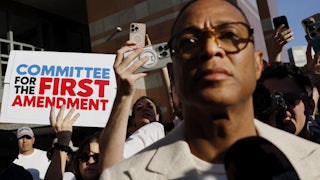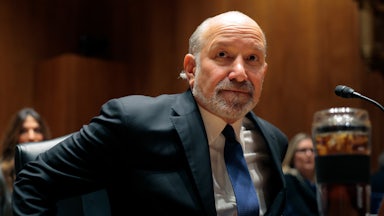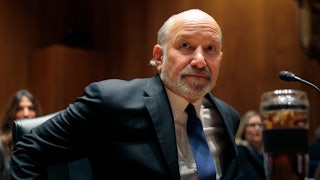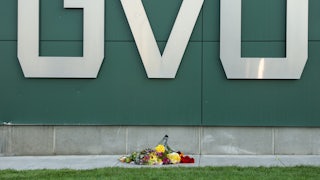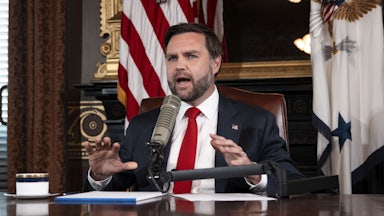Democratic politicians and pundits have rightly been quick to condemn not just Charlie Kirk’s brutal murder but a “horrifying wave of political violence in America,” as the New York Times editorial board put it. Ezra Klein began his elegy for the way Kirk practiced politics by stating that the “foundation of a free society is the ability to participate in politics without fear of violence.” Worrying trends in the other direction, the editorial board and Klein both suggested, are evidenced not only by Kirk’s shooting but by a drumbeat of disturbing incidents: the assassination of Democratic Minnesota state legislator Melissa Hortman and her husband in June; a blaze that ignited the home of Pennsylvania Governor Josh Shapiro on the first night of Passover; the attempted assassination of Donald Trump on the campaign trail; and the right’s raid on the U.S. Capitol on January 6, 2021, intended to overturn the results of the 2020 presidential election.
As The Economist acknowledged, assessing what constitutes political violence is “inherently subjective: analysts must determine which forms of violence count as political and assign ideological labels to attackers or victims.” In recent days, the working definition of political violence that’s emerged across op-ed pages is somewhat narrow: physical assaults on relatively well-known political figures. But what else counts? School shooters often publish rambling manifestos that espouse political motives beforehand. Can violence be considered political if its victims aren’t, or if its authors’ politics are incoherent? What about when federal agents manhandle a U.S. senator—say, California’s Alex Padilla—for trying to question Homeland Security Secretary Kristi Noem at a press conference?
At the 2025 Eradicate Global Hate Summit on Tuesday, Shapiro spoke about the dangers of escalating political violence, which he defined as “people using violence to try to settle political differences.” The governor—who ordered flags across his state flown at half-mast in honor of Kirk—chastised Trump for attempting to “cherry-pick” the instances of political violence he wants to condemn. “Doing so only further divides us and makes it harder to heal,” he said. “There are some who hear that selective condemnation and take it as permission to commit more violence, so long as it suits their narrative or only targets the other side.” Shapiro took explicit aim at the White House’s attempts to use “the long arm of government to silence people, businesses, and nonprofits and restrict their right to free speech.”
Shapiro alluded to the right’s efforts to capitalize on Kirk’s death in order to silence dissent and get revenge on what Vice President JD Vance this week alleged to be a “network” of nongovernmental organizations “that foments, facilitates, and engages in violence.” Just after Kirk was shot, Trump similarly, instinctively, blamed his killing on the “radical left,” promising to “find each and every one of those who contributed to this atrocity and to other political violence, including the organizations that fund it and support it.”
However you define political violence, though, the right is responsible for much more of it in the United States than the left. One study by the Anti-Defamation League (hardly a left-wing organization!) found that all “domestic extremist-related killings” in the U.S. in 2022 were committed by right-wing extremists, the vast majority of them (84 percent) white supremacists.
While condemning Republicans’ opportunistic crackdown on free speech, Shapiro opted for a unifying tone. “Violence in all forms is unacceptable—and political violence is particularly dangerous,” Shapiro continued. “Giving violence a pass, justifying it, or looking the other way only deepens the divide,” he went on. “Let me be clear: Violence is never OK, regardless of the motivation. Violence is never the answer. And we can’t let violence be used as a pretext for more violence. We must reject the rhetoric of vengeance, and instead focus on the work of healing.”
Shapiro’s case is compelling. Even those of us weary of sanitizing Kirk’s despicable views—and ignoring the right’s affinity for political violence—should recognize how troubling his death is. The hateful things Kirk said could never justify his assassination; that assassination, in turn, doesn’t justify either violent retribution or an end to free expression.
Yet Shapiro’s own record on free speech is murky. Late last month, The Chronicle of Higher Education revealed that Shapiro used an archaic, little-used statute allotting Pennsylvania’s governor a nonvoting observer seat on the University of Pennsylvania’s Board of Trustees. Shapiro’s appointed representative to the board, Robb Fox, “pushed the university to ban Penn Students Against the Occupation of Palestine, its main pro-Palestinian student group.” After months of back-channel dialogue between Shapiro’s office, Fox, and the Penn Israel Public Affairs Committee (an on-campus pro-Israel group), Penn did just that, revoking the organization’s status as a registered student group and banning it from campus.
A staunch defender of Israel, Shapiro has staked out what is, by now, a conventional position among mainstream Democrats: cracking down on pro-Palestine protests, decrying hunger in Gaza, demanding the U.S. furnish more aid, and calling on Hamas to return Israeli hostages. He’s criticized Benjamin Netanyahu’s leadership and the Israeli government’s denial of reports about widespread hunger in Gaza, but remained largely silent as to why at least half a million people are trapped in a famine under total Israeli siege there. “These children in Gaza need to be fed, the violence needs to come to an end, the hostages need to come home, and this war needs to be over,” Shapiro said when asked about Israel’s ground invasion of Gaza City this week. He also said Netanyahu was “taking Israel down a very dark and dangerous path.” In a subsequent interview with Forward, Shapiro reiterated these positions. “The roots of my faith and support of Israel were formed decades ago,” Shapiro added. “I don’t waffle or waver because of what the polling said.” Just 38 percent of Americans overall—and 8 percent of Democrats—now approve of the military action Israel has taken in Gaza, per a Gallup poll released in July.
Israel’s assault on Gaza has by now left more than 65,000 dead since the fall of 2023, most of them women and children. A wide swath of Israeli government officials, politicians, and military leaders—not just Netanyahu—have been explicit about their intent to destroy Gaza as revenge for Hamas’s attacks on October 7, 2023, which killed an estimated 1,200 Israeli soldiers and civilians. Nissim Vaturi, deputy speaker of the Israeli Parliament, posted that day on social media that Israel’s task must be “erasing the Gaza Strip from the face of the earth.” Finance Minister Bezalel Smotrich declared this past May that Gaza would be “totally destroyed” in six months.
Violence and famine aren’t tragic forces of nature washing over Gaza, leaving apolitical humanitarian crises in their wake. This is a a genocide. An independent inquiry set up by the U.N. Human Rights Council concluded that Israel has “committed four genocidal acts” in the course of its war on Palestinians, including “deliberately inflicting on the group conditions of life calculated to bring about its physical destruction in whole or in part.” Some 70 percent of structures there—hospitals, homes, and schools—have been destroyed. Famine conditions continue to spread throughout Gaza, and more than 2,500 people have been killed attempting to access the minuscule amount of aid that Israel allows to enter.
Is this violence political? In the parlance of the U.S. commentariat this last week, “political violence” would seem to target people who already enjoy “the ability to participate in politics without fear of violence,” as Klein put it. Palestinians are second-class citizens across Israel and the Occupied Palestinian Territories, living under conditions widely described as apartheid, without freedom of movement, opinion, expression, or assembly. Protesters in the West Bank are regularly assaulted and killed by extremist settlers who terrorize and demolish Palestinians’ homes as IDF soldiers stand watch. U.S. citizens ostensibly entitled to the rights of a free society stateside—such as Al Jazeera journalist Shireen Abu Akleh in 2022, and Ayşenur Ezgi Eygi in 2024—have been killed by Israeli forces while attending those demonstrations. As they do with the mountains of dead in Gaza, U.S. officials mostly looked the other way and continued to furnish their killers’ organizations with hundreds of billions in U.S. military aid.
Troubling as it is to imagine shocking events like Kirk’s murder becoming more commonplace in the United States, perhaps the more profound danger is that the government will keep limiting the bounds of who’s entitled to participate in politics at all. The Trump administration hasn’t been shy about its project to strip ever greater numbers of people of what political theorist Hannah Arendt called the “right to have rights”: from alleged gang members and hardened criminals who have no legal status to pro-Palestinian activists who do, like Mahmoud Khalil, as well as day-laborers snatched off the street and shipped to foreign gulags, and trans people.
The point here isn’t to call out Shapiro and other Democrats’ hypocrisy simply for the sake of it. The moral clarity they’ve shown with regard to the evils of political violence and the importance of free speech is admirable. We can’t let violence be used as a pretext for more violence, and should reject the rhetoric of vengeance. As the right seeks to deprive its enemies of the rights to a free society, it’s more dangerous than ever to apply those principles selectively.
